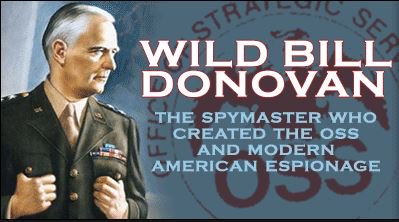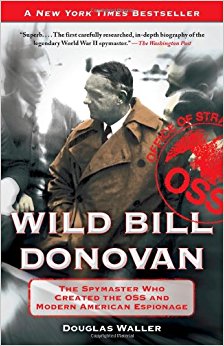Donovan started the war-time intelligence and special operations organization from scratch and built it into the premier organization that deserved much better than to be disbanded at war’s end.
Just before the US entered the war several of the aides of FDR as well as Donovan were lobbying the Roosevelt administration on the need for a coordinated American intelligence service partnered with the United Kingdom. This was echoed by Admiral Godfrey, Britain’s Naval Intelligence chief, and his aide, Commander Ian Fleming. Fleming as many of you will recall was the author of the James Bond books. Donovan spelled out his feelings on how the organization should be run and organized was sent to Roosevelt in a memo.
“Strategy, without information upon which it can rely, is helpless,” Donovan’s memo said. “Likewise, information is useless unless it is intelligently directed to the strategic purpose.”
Like any other new or upstart organization, Donovan made several enemies in the highly politicized seas of Washington. The new unit and the commander of OSS had the ear of the President and besides the service intelligence chiefs who never cooperated with one another and always jockeying for position, Donovan and OSS made enemies with the FBI and especially the Director J. Edgar Hoover.
Hoover hated Donovan with a passion and kept files on all of his comings and goings and tried to discredit everything he did as well as accusing him of some outlandish things, all of which were proven false. When Donovan passed away in 1959 of dementia, Hoover tried to spread the rumor that it was from syphilis.
Through Donovan’s leadership and ability to get things done, in just two short years, Donovan along the British SOE had infiltrated several teams into occupied France before the D-Day landings and they supplied, trained and advised French Resistance groups that proved invaluable for the war effort. Just prior to the invasion, the Resistance and OSS/SOE had planned on cutting the French rails in the Normandy area in 1050 places. The accomplished the mission in 950 of them. This operation was Donovan and the OSS’ finest hour. Led by extraordinary agents such as Virginia Hall, the missions were an unqualified success. The book is filled with the many successes and the few failures of the organization.
The men who served Donovan during the war years as he called them “PhDs who can win a bar fight turned into a veritable who’s who in the later years of both CIA and the US Army Special Forces. Allen Dulles, William Colby were OSS operatives who became the Directors of National Intelligence. Aaron Bank was an OSS veteran who conducted successful missions in Europe. He went to Vietnam, then French-Indo China and met with the Viet Minh guerrilla chief Ho Chi Minh. He tried unsuccessfully to get the US to support Ho despite his Communist leanings over the return of French colonial rule which he saw as an upcoming failure.
Eventually, Donovan’s enemies got the ear of Harry Truman who took over from FDR after the President died in the latter days of WWII. Truman recognized that the US needed a professional intelligence service but not one with Donovan at its head. He had OSS disbanded after the war and then two years later created CIA with many of the same people that Donovan employed.
For the aspiring Special Operators out there, this should be required reading. It gives the background on where the units are today and how they got there. I would also encourage our readers to check out the novels of W.E.B. Griffin on the OSS as well. They were fantastic. We’ll review other books on OSS in the future.
The detail of Waller’s work is extraordinary and it is will quickly become a book that the reader can’t put down. It is a tremendous biography of a great, courageous but still flawed man who unfortunately didn’t live to see how large his former organization had become or the influence it would have around the world. His legacy is alive and well today.
Photos Courtesy: CIA, Wikipedia, and the US Army
This article was originally published on SpecialOperations.com












COMMENTS